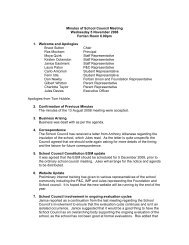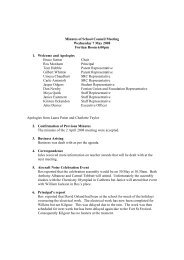HSC English Extension Course 1 Requirements - Fort Street High ...
HSC English Extension Course 1 Requirements - Fort Street High ...
HSC English Extension Course 1 Requirements - Fort Street High ...
Create successful ePaper yourself
Turn your PDF publications into a flip-book with our unique Google optimized e-Paper software.
<strong>HSC</strong> <strong>English</strong> <strong>Extension</strong> <strong>Course</strong> 1 <strong>Requirements</strong> 2012In the <strong>HSC</strong> <strong>English</strong> <strong>Extension</strong> <strong>Course</strong> 1, students explore ideas of value and consider how culturalvalues and systems of valuation arise.Students undertaking <strong>HSC</strong> <strong>English</strong> <strong>Extension</strong> <strong>Course</strong> 1 must complete ONE elective chosen from ONEof the <strong>HSC</strong> Modules A, B or C.Module A: GenreThis module requires students to explore and evaluate notions of genre. It develops their understandingof the conventions and values associated with generic forms.Each elective in this module involves the study of at least two print texts of a particular genre, to beselected from a prescribed text list. In addition, students explore, analyse and critically evaluate a rangeof other examples of this genre from different contexts and media.Students consider the ways in which genres are adapted to different times and cultures and the attitudesand values reflected by these adaptations. They examine why genres arise at particular times and thesocial and cultural conditions that are conducive to their endurance or recurrence in popularity. Studentsconsider the reasons for and validity of generic distinctions.Students develop a range of imaginative, interpretive and analytical compositions, including some thatexplore the possibilities of the genre for a range of audiences. These compositions may be realised invarious forms, modes and media. Students investigate topics and ideas, engage in independent learningactivities and develop skills in extended composition.Module B: Texts and Ways of ThinkingThis module requires students to explore and evaluate a selection of texts relating to a particularhistorical period. It develops their understanding of the ways in which scientific, religious, philosophicalor economic paradigms have shaped and are reflected in literature and other texts.Each elective in this module involves the study of at least two print texts, relating to a particularhistorical period, that demonstrate the influence of particular ways of thinking on literary and othertexts. In addition, students explore, analyse and critically evaluate a range of other texts that reflect theseideas.Students explore the ways that values are inscribed in particular texts and how they are reflected bytexts. They consider whether and why texts are valued in their own time. They also consider why and bywhom those texts are valued today.Students develop a range of imaginative, interpretive and analytical compositions, including somewhich explore the effects of particular paradigms for a range of audiences. These compositions may berealised in various forms, modes and media. Students investigate topics and ideas, engage inindependent learning activities and develop skills in extended composition.
Prescriptions: <strong>HSC</strong> 2006-2008Electives and Texts for the <strong>English</strong> <strong>Extension</strong> <strong>Course</strong> 1Electives in the <strong>English</strong> <strong>Extension</strong> <strong>Course</strong> 1 must be considered in the context of the moduledescriptions, course objectives, content and outcomes. (Reread <strong>English</strong> Stage 6 Syllabus, pp 89-91.)Module A: GenreThis module requires students to explore and evaluate notions of genre. It develops their understandingof the conventions and values associated with generic forms. (Reread <strong>English</strong> State 6 Syllabus, p 89.)Elective 1: Revenge TragedyRevenge tragedy usually concerns an individual faced with the duty of revenge in a society where thelaw is unreliable and within the control of the powerful and protected.In this elective students are required to study at least three of the prescribed texts as well as other textsof their own choosing. In their responding and composing they explore, analyse, experiment with andcritically evaluate their prescribed texts and a range of other examples of this genre, which may includetexts that extend or challenge the traditional conventions of revenge tragedy. Texts should be drawnfrom a range of contexts and media.Drama• Euripides, ‘Medea’ in Medea and Other Plays, Penguin Classics, 1986,ISBN 0140441298• Tourneur, Cyril, ‘The Revenger’s Tragedy’ in Three Jacobean Tragedies, Penguin Classics, 1986,ISBN 0140430067• Corneille, Pierre, The Cid, Penguin Classics, 1986, ISBN 0140443126Film• Zinnemann, Fred, <strong>High</strong> Noon, United Artists, 1952Elective 2: Crime FictionThe genre of crime fiction has mystery as its key element. The mystery and its solution by rationalityand the careful accretion of evidence may be the primary focus of the text. This invites the responders’active involvement in the deduction of the solution to the crime. The mystery may also be the vehiclefor other focuses.In this elective students are required to study at least three of the prescribed texts as well as other textsof their own choosing. In their responding and composing they explore, analyse, experiment with andcritically evaluate their prescribed texts and a range of other examples of this genre. They explore thevariety of the crime fiction genre in a range of contexts and media.
Prose Fiction• James, P D, The Skull Beneath the Skin, Faber and Faber, 2001, ISBN 0571204600• Ondaatje, Michael, Anil’s Ghost, Picador, 2000, ISBN 0330480774Drama• Stoppard, Tom, ‘The Real Inspector Hound’ in Tom Stoppard: Plays 1, Faber and Faber, 1996,ISBN 0571177654Film• Hawks, Howard, The Big Sleep – Director’s Cut, Warner, 1945Module B: Texts and Ways of ThinkingThis module requires students to explore and evaluate a selection of texts relating to a particularhistorical period. It develops their understanding of the ways in which scientific, religious, philosophicalor economic paradigms have shaped and are reflected in literature and other texts. (Reread <strong>English</strong> Stage6 Syllabus, p 89.)Elective 2: PostmodernismPostmodernism has arisen within the context of questioning certainties about time and space. It involvesthe playful challenge of fundamental principles and assumptions about the nature of texts. Byhighlighting the conventions and clichés of the forms and functions of texts, accepted notions oforiginality, authorship and the nature of representation are challenged.In this elective students are required to study at least three of the prescribed texts as well as other textsof their own choosing. In their responding and composing they explore, analyse, experiment with andcritically evaluate their prescribed texts and a range of other examples relating to this elective. Textsshould be drawn from a range of contexts and media and may support, question or challenge theprecepts of postmodernism.Prose Fiction• Byatt, A S, Possession, Vintage, 1991, ISBN 0099800403• Calvino, Italo, If on a winter’s night a traveller, Vintage, 1992, ISBN 0749399236• Fowles, John, The French Lieutenant’s Woman, Vintage, 1997, ISBN 0099737612Drama• Williamson, David, Dead White Males, Currency Press, 1995, ISBN 0868194433Film• Potter, Sally, Orlando, 21 st Century, 1993 (Educational distributor: Ronin Films)
















